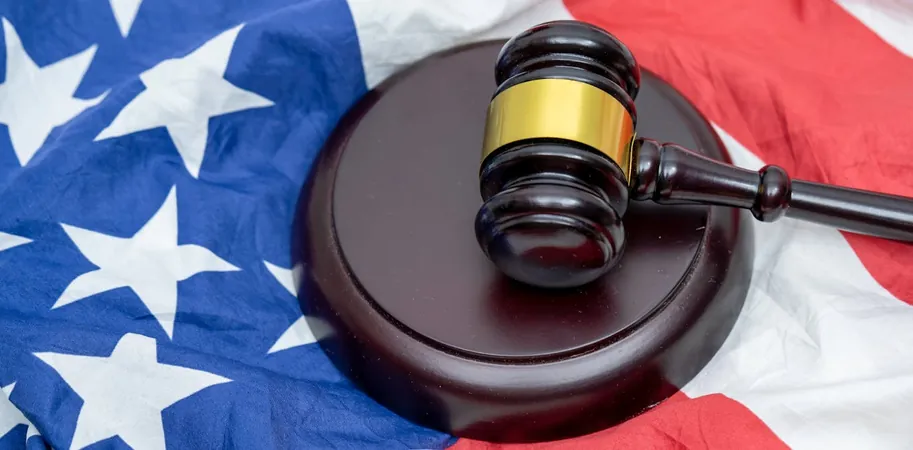
What an 'Unconditional Discharge' for Trump Could Mean in His Hush Money Case: A Legal Breakdown
2025-01-09
Author: Michael
Trump's Felony Conviction
In a historic development, Donald Trump is on track to become the first former president of the United States with a felony conviction following a New York jury's decision. On May 30, 2024, Trump was found guilty on 34 counts of falsifying business records, classified as a Class E felony in New York. This designation applies when an individual commits falsification with the intent to defraud or conceal another crime.
Implications of a Class E Felony
The implications of such a felony conviction are significant, as Class E felonies in New York can carry a potential sentence of up to four years in prison and fines up to $5,000 per count. However, judges often have discretion over sentencing, considering factors like the defendant’s prior criminal record.
Legal Team's Challenges
Trump's sentencing is scheduled for January 10, 2025, but his legal team is actively seeking to have the guilty verdict overturned. Recently, they have cited a ruling from the U.S. Supreme Court that highlights presidential immunity in criminal prosecutions, arguing that such immunity should protect Trump from his conviction, which occurred before his presidency began.
Supreme Court Ruling
On July 1, 2024, the Supreme Court ruled that presidents enjoy "absolute immunity from criminal prosecutions for actions within his constitutional authority." However, their ruling also clarified that this immunity does not extend to unofficial acts, which is central to Trump's case.
Justice Merchan's Dismissal of Immunity Argument
On January 3, 2025, Justice Juan Merchan, who oversaw Trump's trial, dismissed the argument of presidential immunity in this case, stating that the Supreme Court's decision does not apply to Trump’s actions in New York. Following this, the New York State’s highest court declined to intervene in Trump’s sentencing.
Preference for Unconditional Discharge
Interestingly, Justice Merchan has shown a distinct inclination against imposing prison time on Trump. In his decision, Merchan indicated a preference for a sentence that reflects Trump's circumstances rather than one that would result in incarceration. He suggested that an "unconditional discharge" could be a fitting resolution, which would impose no penalties such as jail time or parole—effectively allowing Trump to avoid prison.
Definition and Legal Basis of Unconditional Discharge
An unconditional discharge is permissible under New York law if the court believes that neither public interest nor justice necessitates imprisonment. Justice Merchan’s rationale seems to stem from a desire to finalize the case, allowing Trump to pursue his appeals without the burden of a prison sentence.
Unique Legal Circumstances
If Justice Merchan proceeds with this approach, it would be seen as legally sound based on New York State’s discretionary sentencing framework. Trump's unique position—even seeking to contest a guilty verdict before sentencing—raises questions, as typically, defendants appeal post-sentencing. Yet, in this unprecedented case, Merchan hinted that moving forward with sentencing would benefit Trump by allowing him to appeal the guilty verdict more effectively.
Political Implications
The outcome of this legal battle is deeply intertwined with Trump's political aspirations as he runs for a second term. While the legal community remains divided, many experts predict that any potential sentence could be deferred until after the elections, reflecting the complex interplay of law and politics in this extraordinary situation. As developments unfold, the broader implications for American political life and the legal system remain to be seen.



 Brasil (PT)
Brasil (PT)
 Canada (EN)
Canada (EN)
 Chile (ES)
Chile (ES)
 Česko (CS)
Česko (CS)
 대한민국 (KO)
대한민국 (KO)
 España (ES)
España (ES)
 France (FR)
France (FR)
 Hong Kong (EN)
Hong Kong (EN)
 Italia (IT)
Italia (IT)
 日本 (JA)
日本 (JA)
 Magyarország (HU)
Magyarország (HU)
 Norge (NO)
Norge (NO)
 Polska (PL)
Polska (PL)
 Schweiz (DE)
Schweiz (DE)
 Singapore (EN)
Singapore (EN)
 Sverige (SV)
Sverige (SV)
 Suomi (FI)
Suomi (FI)
 Türkiye (TR)
Türkiye (TR)
 الإمارات العربية المتحدة (AR)
الإمارات العربية المتحدة (AR)